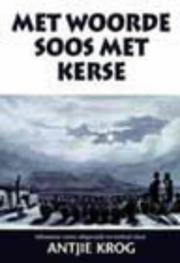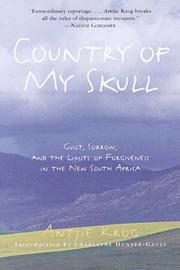| Listing 1 - 10 of 80 | << page >> |
Sort by
|
Book
ISBN: 062404209X 9780624042099 Year: 2005 Publisher: Kaapstad Tafelberg
Abstract | Keywords | Export | Availability | Bookmark
 Loading...
Loading...Choose an application
- Reference Manager
- EndNote
- RefWorks (Direct export to RefWorks)
Afrikaans literature --- Authors, Afrikaans --- Authors, Afrikaans. --- Group identity --- Group identity. --- Social change --- Social change. --- Social conditions. --- Krog, Antjie. --- Since 1900. --- South Africa --- South Africa. --- Zuid-Afrika. --- Social conditions

ISBN: 0795701187 9780795701184 Year: 2004 Publisher: Kaapstad Kwela
Abstract | Keywords | Export | Availability | Bookmark
 Loading...
Loading...Choose an application
- Reference Manager
- EndNote
- RefWorks (Direct export to RefWorks)
Book
ISBN: 0947046186 9780947046187 Year: 1989 Publisher: Bramley Taurus
Abstract | Keywords | Export | Availability | Bookmark
 Loading...
Loading...Choose an application
- Reference Manager
- EndNote
- RefWorks (Direct export to RefWorks)
Afrikaans poetry. --- Literature. --- Barnard, Anne Lindsay, --- In literature.
Book
ISBN: 9781770220706 1770220704 Year: 2010 Publisher: Cape Town Random house Struik
Abstract | Keywords | Export | Availability | Bookmark
 Loading...
Loading...Choose an application
- Reference Manager
- EndNote
- RefWorks (Direct export to RefWorks)
"In 1992, a gang leader was shot dead by an ANC member in Kroonstad. The murder weapon was then hidden on Antjie Krog's stoep. In Begging to Be Black, Krog begins by exploring her position in this controversial case. From there the book ranges widely in scope, both in time - reaching back to the days of Basotho king Moshoeshoe - and in space, as we follow Krog's experiences as a research fellow in Berlin, far from the Africa that produced her. Begging to Be Black is a book of journeys - moral, historical, philosophical and geographical. These form strands that Krog interweaves and sets in conversation with each other, as she explores questions of change and becoming, coherency and connectedness, before drawing them closer together as the book approaches its powerful end. Experimental and courageous, Begging to Be Black is a welcome addition to Krog's own oeuvre and to South African literary non-fiction"--Book jacket.
Group identity --- Social change --- #SBIB:39A5 --- #SBIB:39A73 --- Change, Social --- Cultural change --- Cultural transformation --- Societal change --- Socio-cultural change --- Social history --- Social evolution --- Collective identity --- Community identity --- Cultural identity --- Social identity --- Identity (Psychology) --- Social psychology --- Collective memory --- Kunst, habitat, materiële cultuur en ontspanning --- Etnografie: Afrika --- Krog, Antjie. --- South Africa --- Africa, South --- Ethnic relations.

ISBN: 0812931297 9780812931297 Year: 2000 Publisher: New York, N.Y. Three Rivers Press
Abstract | Keywords | Export | Availability | Bookmark
 Loading...
Loading...Choose an application
- Reference Manager
- EndNote
- RefWorks (Direct export to RefWorks)
"Ever since Nelson Mandela dramatically walked out of prison in 1990 after twenty-seven years behind bars, South Africa has been undergoing a radical transformation. In one of the most miraculous events of the century, the oppressive system of apartheid was dismantled. Repressive laws mandating separation of the races were thrown out. The country, which had been carved into a crazy quilt that reserved the most prosperous areas for whites and the most desolate and backward for blacks, was reunited. The dreaded and dangerous security force, which for years had systematically tortured, spied upon, and harassed people of color and their white supporters, was dismantled. But how could this country – one of spectacular beauty and promise – come to terms with its ugly past? How could its people, whom the oppressive white government had pitted against one another, live side by side as friends and neighbors?To begin the healing process, Nelson Mandela created the Truth and Reconciliation Commission, headed by the renowned cleric Archbishop Desmond Tutu. Established in 1995, the commission faced the awesome task of hearing the testimony of the victims of apartheid as well as the oppressors. Amnesty was granted to those who offered a full confession of any crimes associated with apartheid. Since the commission began its work, it has been the central player in a drama that has riveted the country. In this book, Antjie Krog, a South African journalist and poet who has covered the work of the commission, recounts the drama, the horrors, the wrenching personal stories of the victims and their families. Through the testimonies of victims of abuse and violence, from the appearance of Winnie Mandela to former South African president P. W. Botha’s extraordinary courthouse press conference, this award-winning poet leads us on an amazing journey.Country of My Skull captures the complexity of the Truth Commission’s work. The narrative is often traumatic, vivid, and provocative. Krog’s powerful prose lures the reader actively and inventively through a mosaic of insights, impressions, and secret themes. This compelling tale is Antjie Krog’s profound literary account of the mending of a country that was in colossal need of change."--
Apartheid --- -Political violence --- -#SBIB:013.AANKOOP --- #SBIB:328H413 --- Violence --- Political crimes and offenses --- Terrorism --- Separate development (Race relations) --- Segregation --- Anti-apartheid movements --- Post-apartheid era --- Instellingen en beleid: Zuid-Afrika --- South Africa. Truth and Reconciliation Commission --- South Africa --- Race relations. --- Ethnic relations. --- Race question --- English literature --- -South Africa. Truth and Reconciliation Commission
Book
ISBN: 0798117362 Year: 1984 Publisher: Kaapstad Human en Rousseau
Abstract | Keywords | Export | Availability | Bookmark
 Loading...
Loading...Choose an application
- Reference Manager
- EndNote
- RefWorks (Direct export to RefWorks)
Book
ISBN: 079811939X Year: 1985 Publisher: Kaapstad Human en Rousseau
Abstract | Keywords | Export | Availability | Bookmark
 Loading...
Loading...Choose an application
- Reference Manager
- EndNote
- RefWorks (Direct export to RefWorks)
Book
ISBN: 079810211X 9780798102117 Year: 1972 Publisher: Kaapstad Human en Rousseau
Abstract | Keywords | Export | Availability | Bookmark
 Loading...
Loading...Choose an application
- Reference Manager
- EndNote
- RefWorks (Direct export to RefWorks)
Book
ISBN: 0798105860 Year: 1975 Publisher: Kaapstad Human en Rousseau
Abstract | Keywords | Export | Availability | Bookmark
 Loading...
Loading...Choose an application
- Reference Manager
- EndNote
- RefWorks (Direct export to RefWorks)
Book
ISBN: 0798105879 Year: 1975 Publisher: Kaapstad Human en Rousseau
Abstract | Keywords | Export | Availability | Bookmark
 Loading...
Loading...Choose an application
- Reference Manager
- EndNote
- RefWorks (Direct export to RefWorks)
| Listing 1 - 10 of 80 | << page >> |
Sort by
|

 Search
Search Feedback
Feedback About UniCat
About UniCat  Help
Help News
News